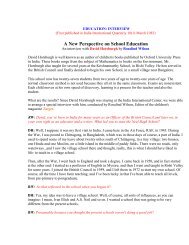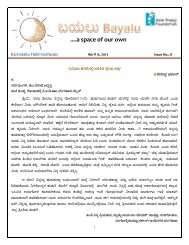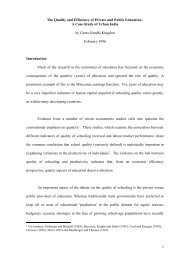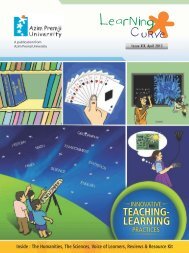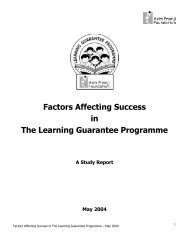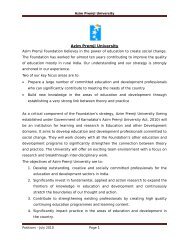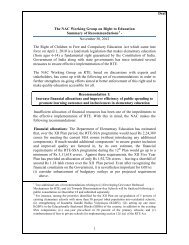Indesign Pagesnew.indd - Azim Premji Foundation
Indesign Pagesnew.indd - Azim Premji Foundation
Indesign Pagesnew.indd - Azim Premji Foundation
You also want an ePaper? Increase the reach of your titles
YUMPU automatically turns print PDFs into web optimized ePapers that Google loves.
15<br />
Section B<br />
Issues in History Education: Perspectives from<br />
England and the USA<br />
Liz Dawes Duraisingh<br />
In this article I offer a selective overview of some of<br />
the ongoing and emerging issues concerning history<br />
education in England and the USA. I also try to explain<br />
why the history teaching practices in these two countries are<br />
very different.<br />
Some Background<br />
In America, where education is decentralized, individual<br />
states set their own standards and guidelines for teaching<br />
history; however, teachers across the country tend to use<br />
the same textbooks which are produced by big publishing<br />
companies. Students are typically required to take both<br />
American history and World history courses during high<br />
school (age 14-18), although studying history is optional<br />
during their fi nal year. In elementary and middle schools<br />
history is generally subsumed within a broader social studies<br />
curriculum.<br />
In England, a National Curriculum has been in place since<br />
1988. Here I refer solely to England because there are<br />
curriculum differences for history across England, Wales and<br />
Northern Ireland; meanwhile, the Scottish education system<br />
is quite different. Until the age of 14, English students follow<br />
a program of study that prescribes history content, concepts<br />
and skills, as well as expected attainment levels. After age<br />
14, history is no longer mandatory; students who choose to<br />
continue with their studies take GCSE and Advanced Level<br />
history courses which are managed by various examination<br />
boards in accordance with government guidelines.<br />
Whose History? Controversies over Content<br />
Political wrangling aside, however, American<br />
history education is used unabashedly<br />
to promote a sense of national pride and<br />
belonging among students; whatever their<br />
personal family history, American students<br />
will say “We wanted to be free from the<br />
British”, for example, when they talk about<br />
the American War of Independence.<br />
The world over, history is<br />
one of the most contested<br />
subjects on the school<br />
curriculum. Because<br />
history is so intimately tied<br />
to questions of national,<br />
ethnic, religious and<br />
political identity and power,<br />
different groups often compete to see their ‘version’ of the<br />
past represented in school history textbooks and curricula.<br />
Of course, India itself has not been immune to such struggles<br />
in recent years.<br />
In America, the recent controversy surrounding the social<br />
studies curriculum review in Texas was a reminder of<br />
how history education continues to be a battleground<br />
for different political agendas in this country. The stakes<br />
were high because Texas has one of the largest education<br />
budgets in America; textbook publishers tend to cater to<br />
Texan curriculum specifi cations which are reviewed every<br />
ten years. This time, conservative advocates successfully<br />
pushed for revisions that downplayed the Founding Fathers’<br />
intent to create a secular government for America; they<br />
also secured a more prominent place for their hero Ronald<br />
Reagan. In contrast, attempts by other groups to include<br />
more positive Hispanic role models were thwarted.<br />
Political wrangling aside, however, American history education<br />
is used unabashedly to promote a sense of national pride<br />
and belonging among students; whatever their personal<br />
family history, American students will say “We wanted to be<br />
free from the British”, for example, when they talk about the<br />
American War of Independence. The overarching story told<br />
by American textbooks is one of American exceptionalism and<br />
of ever-expanding rights and freedoms for all her citizens,<br />
as evidenced, for instance, by the abolition of slavery and<br />
the civil rights movement. Today’s history textbooks do<br />
include the perspectives of at least some of the groups<br />
who were once sidelined from offi cial accounts of America’s<br />
past; nevertheless, the traditional national narrative remains<br />
intact.<br />
The type of content studied in England is quite different,<br />
although during the 1980s in particular many on the<br />
right—including Margaret Thatcher—argued forcefully<br />
that students should learn a straightforward narrative of<br />
Pg No: 72



